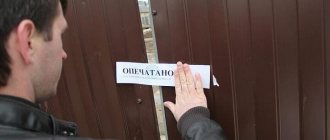Who is an illegal resident
The legislator defines the following categories of citizens who are recognized as illegal residents:
- Persons who have moved into an apartment without permission. For example, a family moved into an abandoned house, cleaned it up, and later it was determined that it was someone else's property.
- Persons whose lease agreement or other agreement under which housing was provided has expired (employment agreement in the case of a service apartment).
- Persons who have lost the right to use an apartment on the basis of family kinship (former spouses).
- Persons who systematically violate the terms of the rental agreement (non-payment of utilities, damage to property, etc.).
Before going to court to evict illegal tenants, you can try to convince them to move out of the apartment voluntarily.
It is worth understanding that the only way to force residents to leave the apartment forcibly is to obtain a court decision on this. Contacting the police will only help you record the fact of a violation.
Reasons for the appearance of illegal residents
Finding yourself in the role of a person who wants to evict illegal residents from an apartment, you should start by asking how they got there in the first place.
There are several possible answers:
- The lease agreement for the property has come to an end.
- Children who had not reached the age of majority were moved in bypassing the owner of the property.
- The private house was subleased to third parties.
- People with family ties to the former tenant began to live on the square.
- After a divorce, the spouse also falls into the category of illegally residing persons.
- People who have lost their certificates of ownership are theoretically not eligible to occupy living space.
- Forgery and falsification of documents for the purpose of occupying private property.
- The papers that gave permission to use the apartment were lost or became invalid.
Watch the video: “They seized the apartment. How to evict people living illegally from an apartment.”
How to draw up a claim correctly
A claim for eviction from an apartment of those living in it illegally must comply with the general requirements for such a statement, which are enshrined in Article 131 of the Code of Civil Procedure of the Russian Federation. The first part of this article states that the statement of claim must be drawn up in writing, but the legislator does not oblige this to be done using technical means - the statement can be written by hand, but all requirements for registration must be met.
If your handwriting is illegible, this may cause your claim to be denied, so it is still better to type the application on a computer. This will show respect for the court.
In part of the quadruple art. 131 of the Code of Civil Procedure of the Russian Federation, introduced in 2021, the legislator allows filing a claim in electronic form via the Internet, by posting it on the official website of the judicial authority. However, it must be properly certified with an “electronic signature” in compliance with all the requirements of the Federal Law “On Electronic Signatures”.
How to file a claim for eviction and deregistration?
Do you want to evict tenants from your living space? You may have difficulties. This is due to current legislation in the case of different circumstances and categories of premises. Today there are solutions that can become the main reason for the eviction of citizens in the case of real estate:
- Termination of a contract under a rental agreement;
- At night, the silence is broken;
- Use of the apartment for other purposes;
- Termination of relations between the owner of the residential premises and the family who live in his residential area;
- Uninterrupted drinking, strong extraneous sounds;
- Drug use and so on.
Eviction claim for non-payment of utilities
Do you have utility bills? The services will go to court and enforce this. Even if the amount has been fully repaid, the house or apartment can be sold with deregistration of the owner, as well as family members, only if it is established that such an apartment is suitable for habitation. If there is no other housing, then under Article 446 of the Code of Civil Procedure of the Russian Federation it is prohibited to go to court based on writs of execution.
Lawsuit to evict ex-spouse
The Housing Code of the Russian Federation is based on legislative projects that prohibit citizens from using living space in the future. This applies to family relationships directly with the owner. As a result, if the spouses are divorced, the second spouse's ownership of the property ceases. A spouse can be evicted voluntarily or forcibly.
From the service living quarters
The use of office premises is carried out under the contract of the employer. May be terminated at different times. The contract is terminated, and residents are subject to eviction from service housing in the event of termination of service. If it continues to operate, then the residents have the right to live until the end of the term.
The administration's claim for eviction from a dilapidated house
Many situations arise if a house is considered unsafe. If the owners of such premises did not carry out its reconstruction or demolition, then the local government authority makes a decision to seize it. If there is an appropriate agreement, then the owner should be presented with a contract for value with the possibility of further payment.
Who can file an eviction claim in court?
The legislator emphasizes that only the owner of the property can file a claim for eviction from an apartment of those illegally living there. It can be:
- individual;
- municipal administration;
- entity.
If the basis for eviction is illegal residence, then third parties (neighbors) do not have the right to go to court. They can send a complaint about the improper behavior of residents and violation of their rights to the owner of the apartment, and he must contact the justice authorities if he considers it necessary.
Claim for eviction and deregistration - how to write
If a citizen does not live in the corresponding apartment, but continues to be registered according to documents, the process of deregistration occurs. Sometimes the owner wants to check out of the apartment because it is expensive to pay for utilities. Typically, people who do not live at the specified cost do not pay their own share of utilities.
Statement of claim to the court for the eviction of illegal residents from an apartment
As a rule, eviction from arbitrarily occupied living space is carried out through the court. During the trial, you can prove that you have the right to be in an apartment or other property. In some cases, the legislation prescribes making a decision on deregistration using an administrative procedure, that is, through the prosecutor's office. In this case, the citizen can appeal the prosecutor's decision through the court. Execution by a court decision or a prosecutor's decision can be carried out voluntarily or compulsorily. Eviction is the abandonment of living space, which is indicated in the executive document dated;
- Property and animals, the citizen of which is a violator;
- A citizen who independently occupied living space.
In case of going to court, the plaintiff may be:
- Prosecutor;
- Home owner;
- A person whose interests are affected by illegal residence.
A citizen has the right to forcibly de-register only after effective evidence of unauthorized residence. You can download the claim form for eviction and deregistration here.
Sample letter of eviction
Former family members are:
- Spouses are divorced;
- Parents;
- Minor children and other persons.
If a family member is no longer related, he loses the use of the living space. After this, he must move out of the apartment. If any obstructive measures are taken, then a deadline is set for deregistration in the form of a written warning.
A sample statement of claim from a family member of the apartment owner, taking into account the latest changes in legislation, can be downloaded here.
The amount of state duty when filing an eviction claim
It all depends on the number of claims that were presented in court. As a rule, the standard state fee when filing a claim is 200 rubles. If the defendant lives in the apartment, you can write your demands for eviction. If he does not live, then recognize the loss of the right to use the living space.
Sample claim for eviction of illegal residents
In order for the claim to be accepted by the judge, the following must be indicated in the claim:
- the exact name of the judicial authority to which the application is submitted;
- details of the plaintiff, if it is an organization, then its full name and location;
- data of the representative, as well as a link to the document on the basis of which he has the right to participate in the trial;
- details of the defendant and his representative (if any);
- the exact address of the disputed residential premises;
- the grounds on which the right of ownership of housing arose, the date of its origin;
- the circumstances under which the defendant was moved into the apartment;
- the reasons why his residence became illegal, indicating the date;
- the plaintiff’s demands (method, period of eviction);
- links to documents and legal acts confirming the validity of the eviction requirements;
- list of attached documents;
- signature of the plaintiff (or his representative), date of drawing up the application.
How to write a letter of claim for eviction
The statement of claim is drawn up in full accordance with the requirements of Art. 131 Code of Civil Procedure of the Russian Federation. It is necessary to prepare a claim in an amount equal to the number of participants in the process. At a minimum, three copies of the statement of claim are prepared: for the court, for the plaintiff and for the defendant. The accompanying documents must also have several copies.
If the interests of the plaintiff are represented by another person (for example, a hired lawyer), it is necessary to issue a power of attorney in his name. It must be notarized.
The statement of claim and documents are submitted to the city or district court of general jurisdiction at the defendant’s place of permanent residence. If the location of the defendant is unknown, the claim is filed at the last known address. In addition, the claim may be sent to the location of the apartment from which an extract is required.
The content of the statement of claim must indicate:
Dear readers! We cover standard methods for solving legal problems, but your case may be unique. We will help you find a solution to your problem for free
— simply call our legal consultant at:
+7 (495) 128-73-40 (Moscow)
+7 (812) 603-71-55 (Saint Petersburg)
8 (800) 302-33-75 (free call within Russia)
It's fast and free ! You can also quickly get an answer through the consultant form on the website.
- name of the judicial authority to which the application is submitted;
- identification data of the plaintiff and defendant - full name, registration addresses, contact information;
- a description of the circumstances of the case in accordance with the sequence of events (when the defendant moved in, what led to the desire to evict him, etc.);
- list of attached documents;
- demand to the court and the defendant with references to regulations;
- date and signature.
Sample statement of claim for eviction of an illegally residing citizen:
Where to submit
As a general rule, a claim for the eviction of illegally residing in an apartment is subject to consideration in the district court of general jurisdiction, which serves the territory in which the disputed apartment is located. After all, a priori the defendant lives there, and the legislator obliges the application to be sent to his place of residence. That is, it does not matter whether the person is registered in the apartment or not.
You can submit a claim with a complete package of documents in the following ways:
- through a representative to a judicial authority;
- by letter with a simple notification and a list of investments at any post office;
- courier service;
- in person to the court office.
Regardless of the method of sending the application, you should have confirmation in your hands that the application has been accepted. This may be a receipt issued on a separate form and a stamp with the date and signature of the employee who accepted the application.
How to prove illegal residence
Since the grounds for living in an apartment (that is, ownership and ownership) are documents of title - a warrant for occupancy or a social tenancy agreement, privatization documents, a certificate of ownership, the absence or invalidity of such documents from persons living in the apartment will indicate that that they have no right to occupy housing.
Each owner has the right to demand the recovery of his property from someone else’s illegal possession (Article 304 of the Civil Code of the Russian Federation), as well as to protect it by all legal means.
If a person illegally living in an apartment does not agree to leave it voluntarily, he will have to go to court with a claim for eviction from the apartment.
To such an application, you must attach your documents on ownership, as well as evidence confirming, in the opinion of the plaintiff, the fact of illegal residence there of specific citizens (defendants).
It must be remembered that in court, each party will have to prove the circumstances to which it refers in support of its claims or objections (Article 56 of the Code of Civil Procedure of the Russian Federation).
Thus, the defendants will have to present documents with which they justify their residence in the apartment. The court will determine what circumstances are important in a particular case, which of the parties (plaintiff or defendant) needs to prove this.
What to do after filing a claim
Within five days after the application is filed, the judge makes a decision to accept the claim for proceedings or leave it without consideration.
If the case is accepted, then the stage of court hearings and debates begins. It is advisable for the plaintiff to be present at each meeting, but you can use the services of a representative; this will help save your time, because in addition to the meetings themselves, each of them will require preparation - studying housing legislation, collecting the necessary additional documents, searching for witnesses.
After hearing all parties and considering all the evidence, the court renders its verdict. The legislator allows the party who disagrees with this decision to file a complaint with a higher court. This may further delay the eviction of illegal occupants.
If the appeal procedure is not started within the established time frame, then the decision enters into legal force and the illegal tenant can be evicted. This can be voluntary or forced.
The owner of the apartment can send the defendant a demand for eviction; if it is not fulfilled by him, then he must contact the bailiff service with a writ of execution. The relevant employee initiates enforcement proceedings and, within its framework, clears the living space not only from the illegal resident, but also from his belongings, pets and other property.
Writing rules, application requirements
An application for eviction (claim) must be drawn up in writing, according to the rules of Art. 131 Code of Civil Procedure of the Russian Federation.
This article defines the main points that must be indicated in the plaintiff's document:
- Name and address of the judicial institution;
- Information about the plaintiff (full name, address, passport details);
- Information about the defendant/defendants;
- The essence of the requirement and the basis for the requirement;
- A request to take certain actions (expel, evict, vacate the apartment from the presence of illegal residents, etc.);
- List of attached documents;
- Date and signature.
The application is accompanied by a copy of the title documents for the housing (on the right of ownership, a social tenancy agreement, if the apartment is municipal), a document on the state duty, copies of the application and documents on the number of persons involved (that is, all participants in the trial).
The court checks the completion and validity of the statement of claim. If the procedure or requirements for the claim are not followed, consideration of it may be refused.







